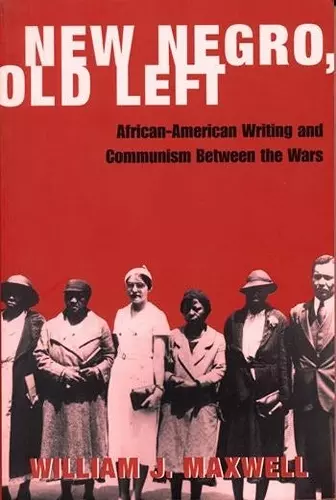New Negro, Old Left
African-American Writing and Communism Between the Wars
Format:Paperback
Publisher:Columbia University Press
Published:8th Sep '99
Currently unavailable, and unfortunately no date known when it will be back

Maxwell uncovers both black literature's debt to Communism and Communism's debt to black literature, reciprocal obligations first incurred during the Harlem Renaissance.
Howard "Stretch" Johnson, a charismatic Harlemite who graduated from Cotton Club dancer to Communist Party youth leader, once claimed that in late 1930s New York "75% of black cultural figures had Party membership or maintained regular meaningful contact with the Party." He stretched the truth, but barely. In a broad-ranging, revisionary account of the extensive relationship between African-American literary culture and Communism in the 1920s and 1930s, William J. Maxwell uncovers both black literature's debt to Communism and Communism's debt to black literature-reciprocal obligations first incurred during the Harlem Renaissance. Juxtaposing well-known and newly rediscovered works by Claude McKay, Andy Razaf, Mike Gold, Langston Hughes, Louise Thompson, Richard Wright, Zora Neale Hurston, and Nelson Algren, Maxwell maintains that the "Old," Soviet-allied Left promoted a spectrum of exchanges between black and white authors, genres, theories, and cultural institutions. Channels opened between radical Harlem and Bolshevik Moscow, between the New Negro renaissance and proletarian literature. Claude McKay's 1922-23 pilgrimage to the Soviet Union, for example, usually recalled as a lighthearted adventure in radical tourism, actually jumpstarted the Comintern's controversial nation-centered program for Afro America. Breaking from studies governed by Cold War investments and pivoting on the Great Depression, Maxwell argues that Communism's rare sustenance for African-American initiative-not a seduction of Depression-scarred innocents-brought scores of literary "New Negroes" to the Old Left.
Lucidly argued and written, New Negro, Old Left is an astute, original addition to work on the Harlem Renaissance, proletarian literature and, in particular, the often misrepresented relationship between them. American Studies William Maxwell's creative and compelling new book presents the case for a mutual indebtedness, a two-way channel 'between radical Harlem and Soviet Moscow, between the New Negro renaissance and proletarian literature' of the 1920s and 1930s. His emphasis on 'Black volition' and the 'interracial education of the Old Left' also aims to enhance our understanding of African American and 'white' modern literature as well as radicalism...This is a book that not only demands the attention of those who wish to be informed about the history of the African American Left, the Harlem Renaissance, and proletarian literature, but that will also engage anyone seeking to understand the potential relevance of contemporary critical arguments from scholars such as Eric Lott, David Roediger, Pierre Bordieu, Eve Sedgwick, Hazel Carby, George Hutchinson, Michael North, Michael Rogin, Robyn Wiegman, and others. Specialists in black culture and Communism will come away from the experience of readingNew Negro, Old Left with a much enriched apprehension of the ambiguities of cultural practice and a salutary desire to open up some of those little boxes ('Harlem Renaissance,' 'proletairan literature,' 'Wright versus Hurston') by means of which we have too neatly classified earlier relationships. -- Alan Wald, University of Michigan American Literature William J. Maxwell'sNew Negro, Old Left: African-American Writing and Communism Between the Wars is a closely argued, thoroughly researched attempt to show how this dominant narrative [of the history of African-American writing during the period between the First and Second World Wars] has often been misleading and reductive...[a] fine book... -- James Grove, Mount Mercy College College Literature In this brilliant book, Maxwell closes significant theoretical gaps in the histories of African American literature and communism. -- D. J. Rosenthal, John Carroll University Choice
- Winner of Choice Outstanding Academic Title 2000
ISBN: 9780231114257
Dimensions: unknown
Weight: unknown
272 pages